Unit3 Could you please clean your room SectionA 3a-3c Reading 公开课课件
文档属性
| 名称 | Unit3 Could you please clean your room SectionA 3a-3c Reading 公开课课件 |  | |
| 格式 | zip | ||
| 文件大小 | 4.9MB | ||
| 资源类型 | 试卷 | ||
| 版本资源 | 人教新目标(Go for it)版 | ||
| 科目 | 英语 | ||
| 更新时间 | 2019-04-28 16:11:52 | ||
图片预览

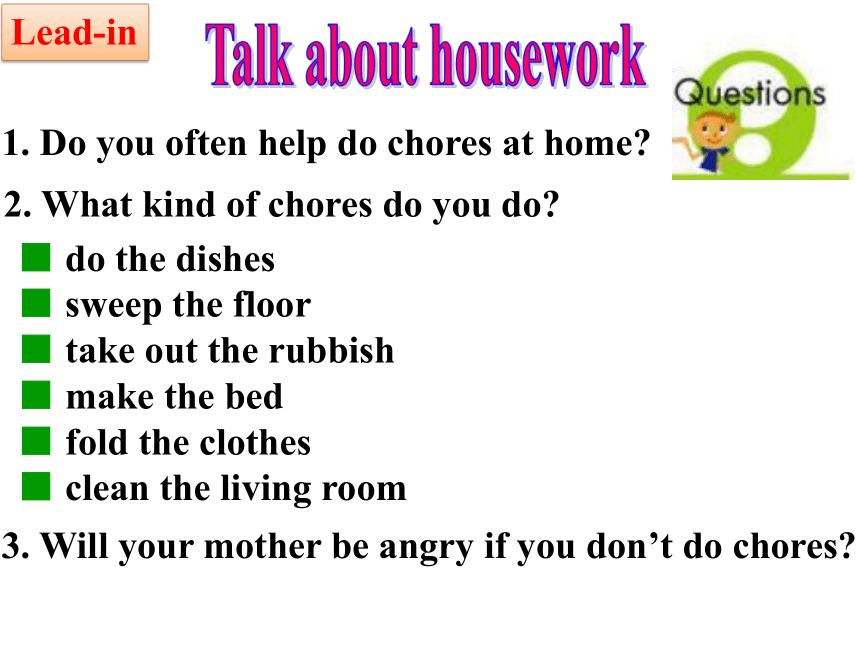
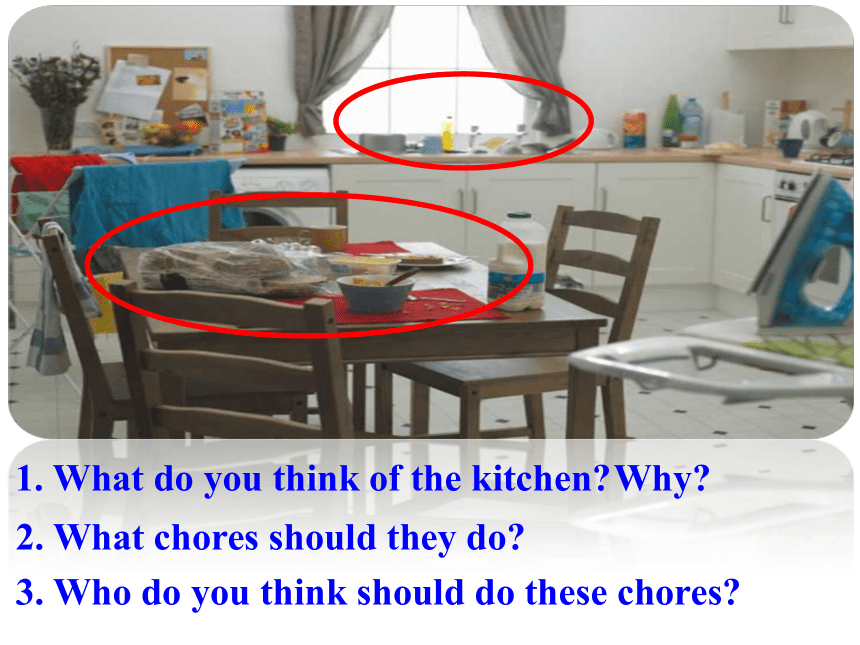
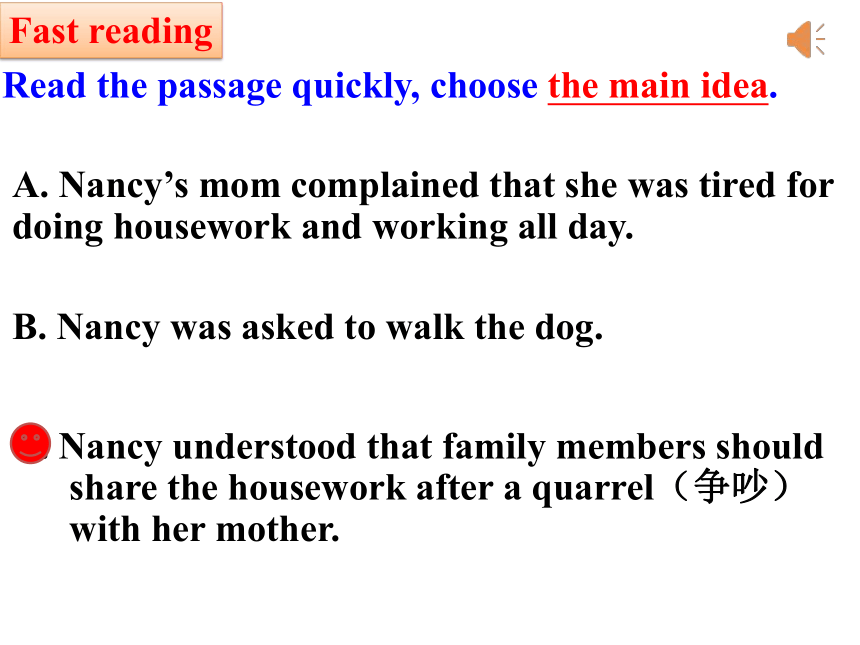
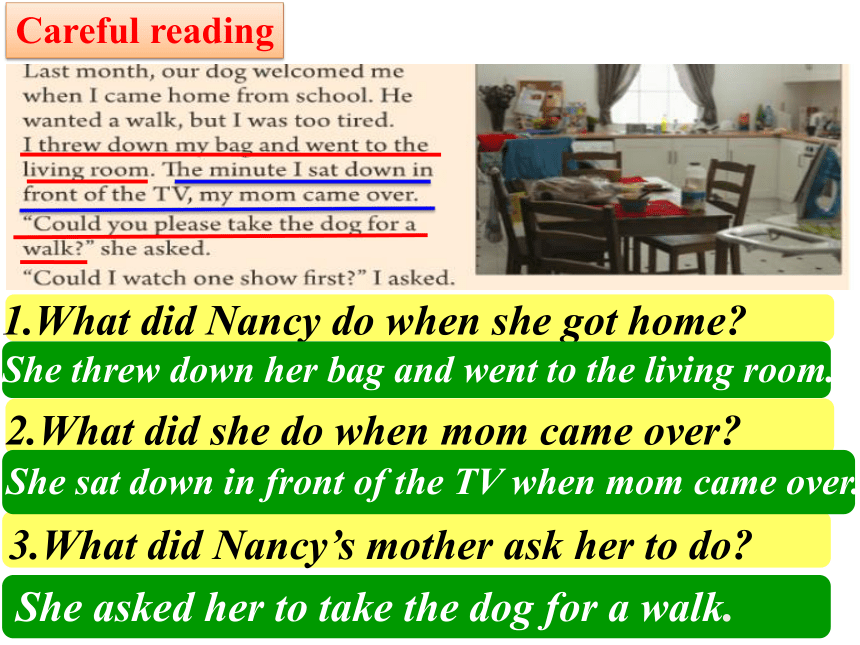
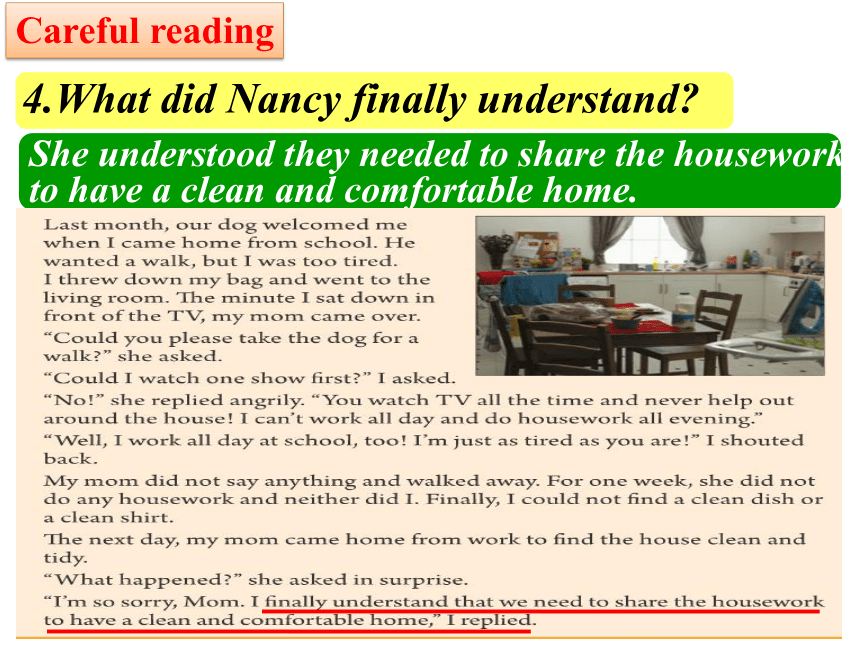
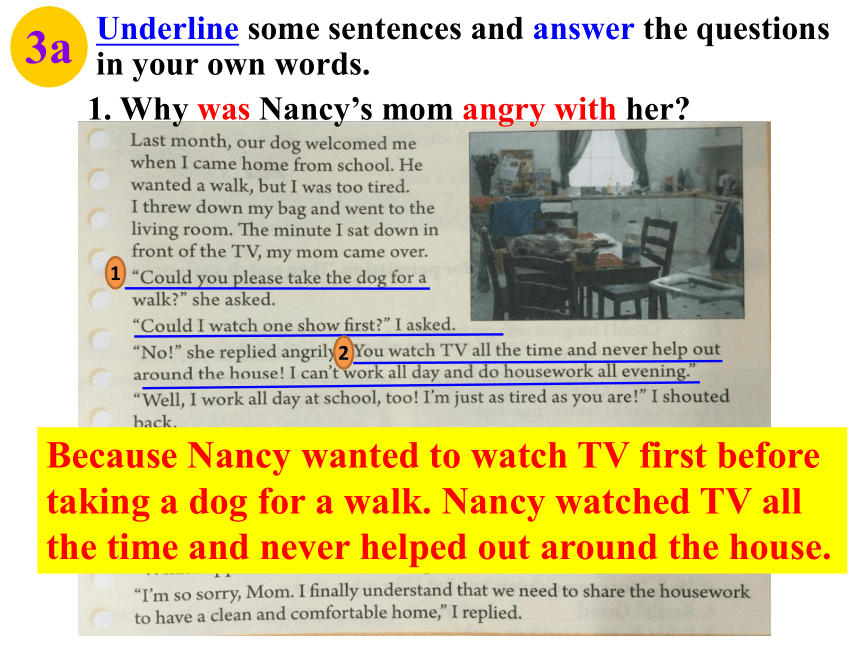
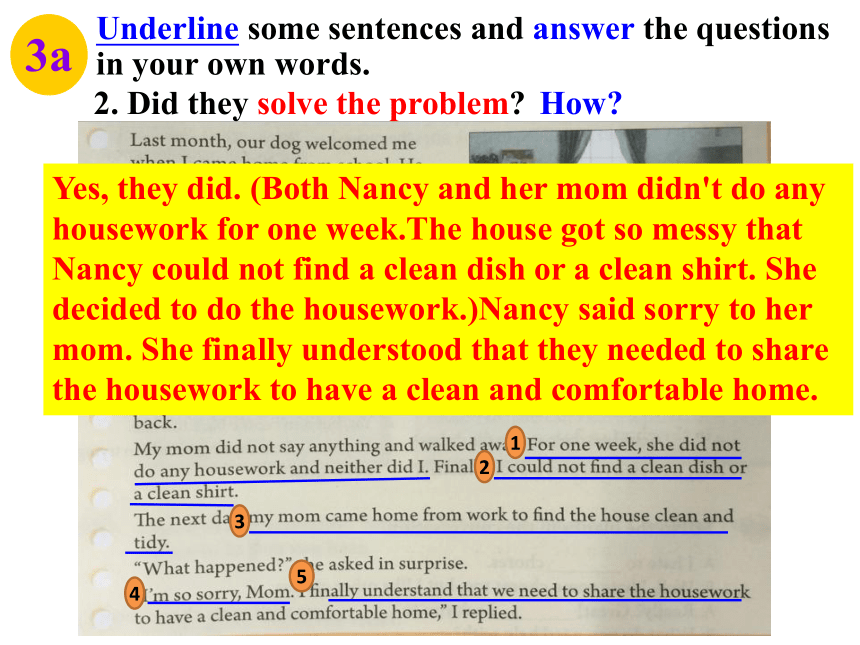
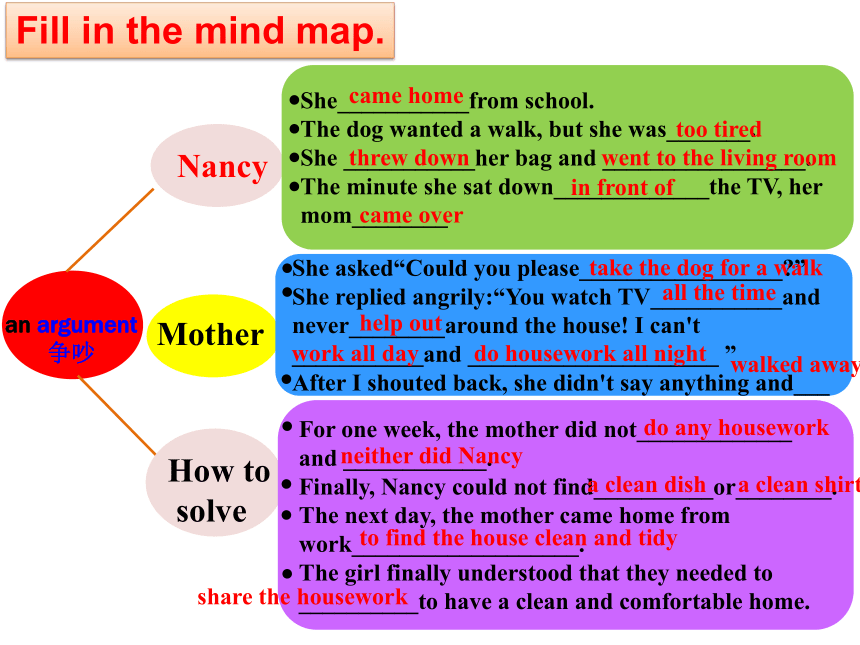
文档简介
Section A
Reading 3a
1. Do you often help do chores at home?
3. Will your mother be angry if you don’t do chores?
Lead-in
Talk about housework
2. What kind of chores do you do?
■ do the dishes
■ sweep the floor
■ take out the rubbish
■ make the bed
■ fold the clothes
■ clean the living room
1. What do you think of the kitchen?
2. What chores should they do?
3. Who do you think should do these chores?
Why?
Fast reading
Read the passage quickly, choose the main idea.
A. Nancy’s mom complained that she was tired for doing housework and working all day.
B. Nancy was asked to walk the dog.
C. Nancy understood that family members should share the housework after a quarrel(争吵) with her mother.
2.What did she do when mom came over?
Careful reading
1.What did Nancy do when she got home?
3.What did Nancy’s mother ask her to do?
She asked her to take the dog for a walk.
She threw down her bag and went to the living room.
She sat down in front of the TV when mom came over.
Careful reading
4.What did Nancy finally understand?
She understood they needed to share the housework to have a clean and comfortable home.
3a
Underline some sentences and answer the questions in your own words.
1. Why was Nancy’s mom angry with her?
Because Nancy wanted to watch TV first before taking a dog for a walk. Nancy watched TV all the time and never helped out around the house.
1
2
3a
2. Did they solve the problem?
1
2
3
4
5
How?
Underline some sentences and answer the questions in your own words.
Yes, they did. (Both Nancy and her mom didn't do any housework for one week.The house got so messy that Nancy could not find a clean dish or a clean shirt. She decided to do the housework.)Nancy said sorry to her mom. She finally understood that they needed to share the housework to have a clean and comfortable home.
She___________from school.
The dog wanted a walk, but she was_______.
She ___________her bag and _________________.
The minute she sat down_____________the TV, her mom________.
She asked“Could you please_________________?”
She replied angrily:“You watch TV___________and never________around the house! I can't ___________and _____________________ ”
After I shouted back, she didn't say anything and___
For one week, the mother did not_____________
and ____________.
Finally, Nancy could not find__________or________.
The next day, the mother came home from work___________________.
The girl finally understood that they needed to __________to have a clean and comfortable home.
Mother
How to
solve
an argument
争吵
Nancy
came home
too tired
threw down
went to the living room
in front of
came over
take the dog for a walk
all the time
help out
work all day
do housework all night
walked away
do any housework
neither did Nancy
a clean dish
a clean shirt
to find the house clean and tidy
share the housework
Fill in the mind map.
throw down扔下
throw-threw-thrown
come over过来;顺便来访;拜访
Key phrases
reply angrily生气地回答
walk away走开
介词短语“吃惊地”,做状语
分担家务
1. The minute I sat down in front of the TV, my mom came over.
正当我坐在电视前,我妈妈就过来了。
the minute … = as soon as … "一…就…",引导时间状语从句
他一听到消息就离开了
He left____ ______ ___ _____ ___ _____.
He left___ ______ ___ _____ _____ ____ _____.
come over 过来
你何不找个晚上到我们这里来坐坐?
Why don't you?_____ ____ __ ___ ______ one evening?
the minute he heard the news
as soon as he heard the news
come over to our place
Language pointes
2. I’m just as tired as you are!
as ... as 意为 “和……一样” ,表示同级的比较。使用时要注意第一个as为副词,第二个as为连词。其基本结构为:as +?adj./?adv.原级?+ as。
e.g. 这部电影和那部电影一样有趣。
This?film?is?as?interesting?as?that?one.
你的钢笔书写起来和我的一样流畅。
Your?pen?writes?as?smoothly?as?mine.
as … as 的否定形式为 “not as/so + adj./adv. + as”。
e.g. 他唱得不如你好。
He didn’t sing as well as you.
3. For one week, she did not do any housework and neither did I.
一个星期以来,她没做任何家务,我也没做。
neither此处用作副词,意为“也不”
neither + be动词/助动词/情态动词 +主语,意为“....也不”。这是一个倒装结构,表示上句否定的情况同样适用于后者。可用nor替换
例如:
— I?don’t?like?this?dress.?
我不喜欢这件连衣裙。
— ___________ __ _.?我也不喜欢。
Neither/ Nor do I
例如:你不会说日语,我也不会。
You can't speak Japanese and ____ __ __
托尼不喜欢做家务,汤姆也不喜欢
Tony doesn't like doing chores and____ ___ __
neither can I
neither does Tom
拓展:
so + be动词/助动词/情态动词 +主语,意为“....也是”。
南希在外面待到很晚,我也是
Nancy stayed out late, and ___ ___ __
so did I
neither 还可作代词,表示“两者都不,双方均不”。做主语时谓语动词用单数
例如:
他两封信都没回。
He?answered____ ___ ____ _____.?
他们两个都不对
____ ___ ____ ____ right.
neither of the letters
Neither of them is
4. You watch TV all the time and never helped out around the house.
你总是看电视在家里从不帮忙
all the time(在该段时间内)一直;向来, 一向;时时刻刻;每时每刻
e.g. 我一直是这么做的。
I do this all the time.
这种情况是时时发生的。
This happens all the time.
5. My mom came home from work to find the house clean and tidy.我妈妈下班回家发现房子既干净又整洁
to do 不定式作状语,表示结果,或没有预料到的事情和事与愿违的事情。
我醒来发现钱包丢了。
I woke up to find my wallet lost.
他搜索了房间,没发现什么。
He searched the room only to find nothing.
Retell
She___________from school.
The dog wanted a walk, but she was_______.
She ___________her bag and _________________.
The minute she sat down_____________the TV, her mom________.
She asked“Could you please_________________?”
She replied angrily:“You watch TV___________and never________around the house! I can't ___________and _____________________ ”
After I shouted back, she didn't say anything and___
For one week, the mother did not_____________
and ____________.
Finally, Nancy could not find__________or________.
The next day, the mother came home from work___________________.
The girl finally understood that they needed to __________to have a clean and comfortable home.
Mother
How to
solve
an argument
争吵
Nancy
Retell
3b Read the sentences below. Underline the sentences from the reading that mean the same thing.
1. Neither of us did any housework for a week.
2. My mom came over as soon as I sat down in front of the TV.
3. You’re tired, but I’m tired, too.
For one week, she did not do any housework and neither did I.
The minute I sat down in front of the TV, my mom came over.
I’m just as tired as you are!
Practice.
3c Decide whether the underlined words in the sentences are verbs or nouns. Then write another sentence using the underlined word in the other form.
1. Could you take the dog for a walk? (noun)
I walked home from school. (verb)
2. Could I watch one show first? (noun)
My friend showed me around the new school. (verb)
3. I can’t work all day. (verb)
Although it’s a little difficult, I have to finish the work today. (noun)
4. You watch TV all the time. (verb)
I lost my watch the day before yesterday. (noun)
5. “What happened?” she asked in surprise. (noun)
The news surprised me. (verb)
Share your ideas.
Do you think kids should help out with chores at home?
We should also care for our
parents and take action to
show love for our family.
Reading 3a
1. Do you often help do chores at home?
3. Will your mother be angry if you don’t do chores?
Lead-in
Talk about housework
2. What kind of chores do you do?
■ do the dishes
■ sweep the floor
■ take out the rubbish
■ make the bed
■ fold the clothes
■ clean the living room
1. What do you think of the kitchen?
2. What chores should they do?
3. Who do you think should do these chores?
Why?
Fast reading
Read the passage quickly, choose the main idea.
A. Nancy’s mom complained that she was tired for doing housework and working all day.
B. Nancy was asked to walk the dog.
C. Nancy understood that family members should share the housework after a quarrel(争吵) with her mother.
2.What did she do when mom came over?
Careful reading
1.What did Nancy do when she got home?
3.What did Nancy’s mother ask her to do?
She asked her to take the dog for a walk.
She threw down her bag and went to the living room.
She sat down in front of the TV when mom came over.
Careful reading
4.What did Nancy finally understand?
She understood they needed to share the housework to have a clean and comfortable home.
3a
Underline some sentences and answer the questions in your own words.
1. Why was Nancy’s mom angry with her?
Because Nancy wanted to watch TV first before taking a dog for a walk. Nancy watched TV all the time and never helped out around the house.
1
2
3a
2. Did they solve the problem?
1
2
3
4
5
How?
Underline some sentences and answer the questions in your own words.
Yes, they did. (Both Nancy and her mom didn't do any housework for one week.The house got so messy that Nancy could not find a clean dish or a clean shirt. She decided to do the housework.)Nancy said sorry to her mom. She finally understood that they needed to share the housework to have a clean and comfortable home.
She___________from school.
The dog wanted a walk, but she was_______.
She ___________her bag and _________________.
The minute she sat down_____________the TV, her mom________.
She asked“Could you please_________________?”
She replied angrily:“You watch TV___________and never________around the house! I can't ___________and _____________________ ”
After I shouted back, she didn't say anything and___
For one week, the mother did not_____________
and ____________.
Finally, Nancy could not find__________or________.
The next day, the mother came home from work___________________.
The girl finally understood that they needed to __________to have a clean and comfortable home.
Mother
How to
solve
an argument
争吵
Nancy
came home
too tired
threw down
went to the living room
in front of
came over
take the dog for a walk
all the time
help out
work all day
do housework all night
walked away
do any housework
neither did Nancy
a clean dish
a clean shirt
to find the house clean and tidy
share the housework
Fill in the mind map.
throw down扔下
throw-threw-thrown
come over过来;顺便来访;拜访
Key phrases
reply angrily生气地回答
walk away走开
介词短语“吃惊地”,做状语
分担家务
1. The minute I sat down in front of the TV, my mom came over.
正当我坐在电视前,我妈妈就过来了。
the minute … = as soon as … "一…就…",引导时间状语从句
他一听到消息就离开了
He left____ ______ ___ _____ ___ _____.
He left___ ______ ___ _____ _____ ____ _____.
come over 过来
你何不找个晚上到我们这里来坐坐?
Why don't you?_____ ____ __ ___ ______ one evening?
the minute he heard the news
as soon as he heard the news
come over to our place
Language pointes
2. I’m just as tired as you are!
as ... as 意为 “和……一样” ,表示同级的比较。使用时要注意第一个as为副词,第二个as为连词。其基本结构为:as +?adj./?adv.原级?+ as。
e.g. 这部电影和那部电影一样有趣。
This?film?is?as?interesting?as?that?one.
你的钢笔书写起来和我的一样流畅。
Your?pen?writes?as?smoothly?as?mine.
as … as 的否定形式为 “not as/so + adj./adv. + as”。
e.g. 他唱得不如你好。
He didn’t sing as well as you.
3. For one week, she did not do any housework and neither did I.
一个星期以来,她没做任何家务,我也没做。
neither此处用作副词,意为“也不”
neither + be动词/助动词/情态动词 +主语,意为“....也不”。这是一个倒装结构,表示上句否定的情况同样适用于后者。可用nor替换
例如:
— I?don’t?like?this?dress.?
我不喜欢这件连衣裙。
— ___________ __ _.?我也不喜欢。
Neither/ Nor do I
例如:你不会说日语,我也不会。
You can't speak Japanese and ____ __ __
托尼不喜欢做家务,汤姆也不喜欢
Tony doesn't like doing chores and____ ___ __
neither can I
neither does Tom
拓展:
so + be动词/助动词/情态动词 +主语,意为“....也是”。
南希在外面待到很晚,我也是
Nancy stayed out late, and ___ ___ __
so did I
neither 还可作代词,表示“两者都不,双方均不”。做主语时谓语动词用单数
例如:
他两封信都没回。
He?answered____ ___ ____ _____.?
他们两个都不对
____ ___ ____ ____ right.
neither of the letters
Neither of them is
4. You watch TV all the time and never helped out around the house.
你总是看电视在家里从不帮忙
all the time(在该段时间内)一直;向来, 一向;时时刻刻;每时每刻
e.g. 我一直是这么做的。
I do this all the time.
这种情况是时时发生的。
This happens all the time.
5. My mom came home from work to find the house clean and tidy.我妈妈下班回家发现房子既干净又整洁
to do 不定式作状语,表示结果,或没有预料到的事情和事与愿违的事情。
我醒来发现钱包丢了。
I woke up to find my wallet lost.
他搜索了房间,没发现什么。
He searched the room only to find nothing.
Retell
She___________from school.
The dog wanted a walk, but she was_______.
She ___________her bag and _________________.
The minute she sat down_____________the TV, her mom________.
She asked“Could you please_________________?”
She replied angrily:“You watch TV___________and never________around the house! I can't ___________and _____________________ ”
After I shouted back, she didn't say anything and___
For one week, the mother did not_____________
and ____________.
Finally, Nancy could not find__________or________.
The next day, the mother came home from work___________________.
The girl finally understood that they needed to __________to have a clean and comfortable home.
Mother
How to
solve
an argument
争吵
Nancy
Retell
3b Read the sentences below. Underline the sentences from the reading that mean the same thing.
1. Neither of us did any housework for a week.
2. My mom came over as soon as I sat down in front of the TV.
3. You’re tired, but I’m tired, too.
For one week, she did not do any housework and neither did I.
The minute I sat down in front of the TV, my mom came over.
I’m just as tired as you are!
Practice.
3c Decide whether the underlined words in the sentences are verbs or nouns. Then write another sentence using the underlined word in the other form.
1. Could you take the dog for a walk? (noun)
I walked home from school. (verb)
2. Could I watch one show first? (noun)
My friend showed me around the new school. (verb)
3. I can’t work all day. (verb)
Although it’s a little difficult, I have to finish the work today. (noun)
4. You watch TV all the time. (verb)
I lost my watch the day before yesterday. (noun)
5. “What happened?” she asked in surprise. (noun)
The news surprised me. (verb)
Share your ideas.
Do you think kids should help out with chores at home?
We should also care for our
parents and take action to
show love for our family.
同课章节目录
- Unit 1 What's the matter?
- Section A
- Section B
- Unit 2 I'll help to clean up the city parks.
- Section A
- Section B
- Unit 3 Could you please clean your room?
- Section A
- Section B
- Unit 4 Why don't you talk to your parents?
- Section A
- Section B
- Unit 5 What were you doing when the rainstorm came
- Section A
- Section B
- Review of Units 1-5
- Unit 6 An old man tried to move the mountains.
- Section A
- Section B
- Unit 7 What's the highest mountain in the world?
- Section A
- Section B
- Unit 8 Have you read Treasure Island yet?
- Section A
- Section B
- Unit 9 Have you ever been to a museum?
- Section A
- Section B
- Unit 10 I've had this bike for three years.
- Section A
- Section B
